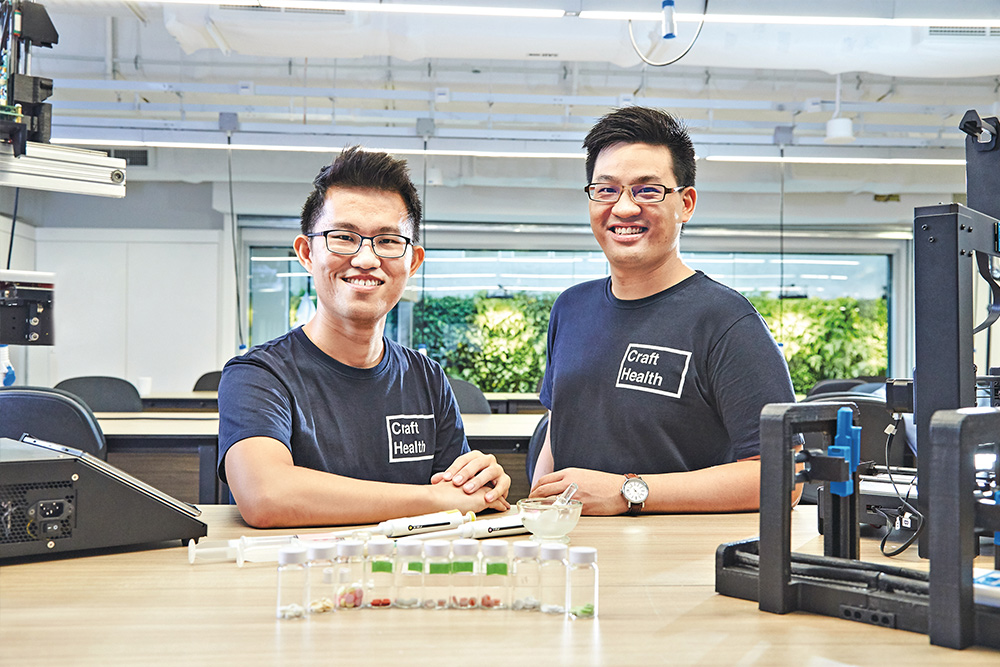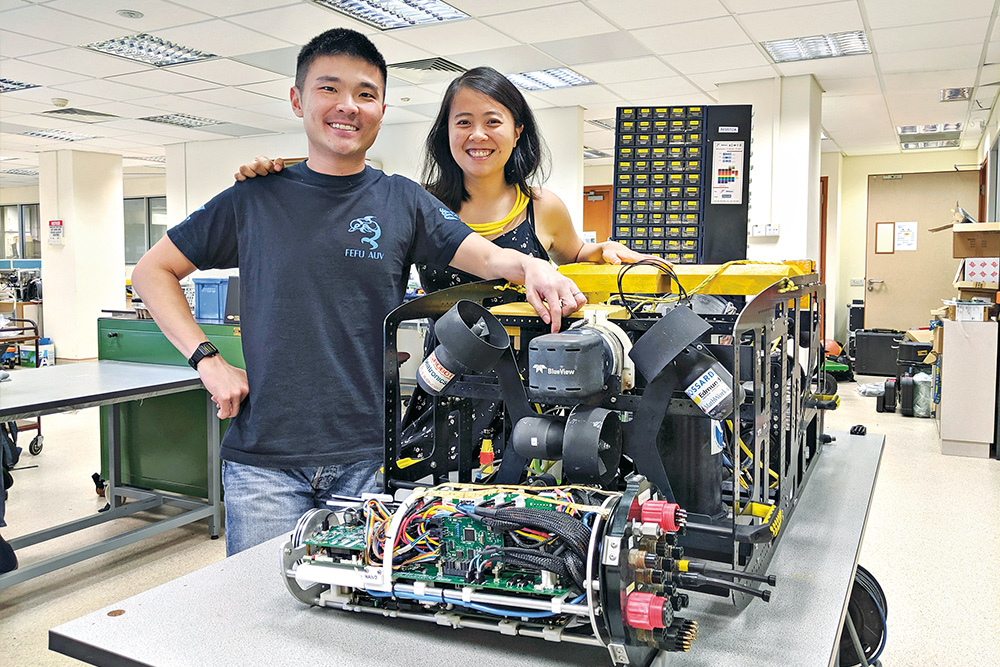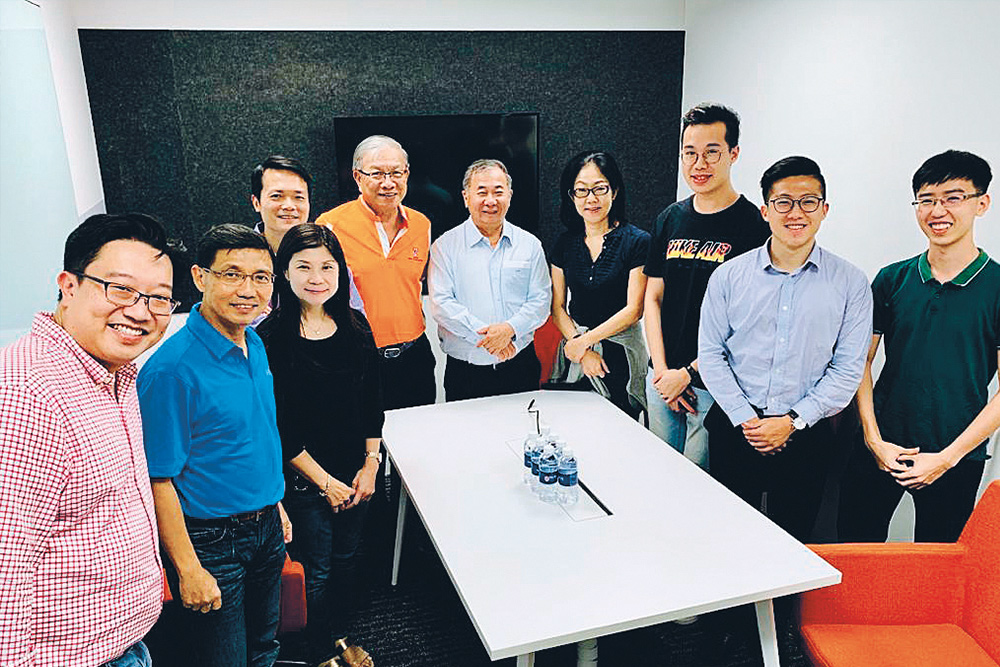The Thinking Behind ‘Singapore Inc.’
A key catalyst of the local start-up scene, NUS has set its sights on becoming a locus of innovation and entrepreneurship across Southeast Asia and China. The payoffs, once realised, will extend far beyond the University.

Carousell, 99.co, ShopBack, MoneySmart — these ventures are household names. And they were all founded in the last decade by NUS alumni, with the backing of their alma mater. In fact, there now exists an entire generation of alumni who graduated after the University had made the tentative first steps on its innovation and entrepreneurship (I&E) journey. This began in 1988 with the establishment of the Centre for Management of Innovation and Technopreneurship (later renamed the NUS Entrepreneurship Centre); today, NUS Enterprise serves as the linchpin of NUS’ I&E activities in Singapore and beyond.
Two of NUS Enterprise’s best-known programmes are NUS Overseas Colleges (NOC), which allows students (mostly undergraduates) to intern at start-ups in business hubs worldwide while taking entrepreneurship courses at renowned partner universities; and BLOCK71, a global network of entrepreneurial hubs to help start-ups grow and access new markets. Working in tandem, the NUS Industry Liaison Office (ILO) is the University’s technology translation and commercialisation arm. It specialises in bringing NUS research to market and manages the resulting intellectual property (IP).
Even then, this barely scratches the surface of all that NUS does to nurture entrepreneurial talent. For example, there are other incubation facilities on campus (The Hangar by NUS Enterprise) and off campus (NUS Enterprise@Singapore Science Park); large events like the annual Innovfest unbound, a showcase for Asian innovations; as well as regular ‘Kopi Chats’ among the start-up community.

Crediting the last 30 years where a strong entrepreneurial foundation was built as “I&E 1.0”, Professor Freddy Boey (Engineering ’87), NUS Deputy President (Innovation & Enterprise) since April 2019, acknowledges the vital role NUS has played in grooming homegrown companies for global success. “NUS was one of the pioneers in building ‘Singapore Inc.’ Under my predecessor Dr Lily Chan [former CEO of NUS Enterprise], NOC and BLOCK71 took off well and created strong branding for NUS in Singapore
and other parts of the world,” says Prof Boey, who heads both NUS Enterprise and ILO in his current appointment. The challenge now is how to keep up this impressive streak. That is, what will “I&E 2.0” for NUS look like?

NUS is first and foremost an educational institution; innovation is one form of education. Our goal is not just to create patents and make a profit, but to create entrepreneurs. It has more to do with producing the person than producing the company.
Prof Freddy Boey, NUS Deputy President (Innovation & Enterprise)
ENGINEERING THE ENTREPRENEURS
Bringing NUS technologies to market and licensing these to third parties would, of course, generate considerable revenue for the University. However, this is not why NUS embarked on I&E to begin with. “NUS is first and foremost an educational institution; innovation is one form of education,” explains Prof Boey. “Our goal is not just to create patents and make a profit, but to create entrepreneurs. It has more to do with producing the person than producing the company.”
In the present Industry 4.0 era, this increasingly means producing technopreneurs — and not just any tech-savvy entrepreneur, but those who establish deep tech start-ups. ‘Deep tech’ refers to cutting-edge, disruptive technologies based on radical scientific or engineering breakthroughs that seek to solve the world’s biggest problems, such as curing cancer or fighting climate change.
Singapore possesses an advantage in this arena due to the Government’s heavy investment in deep tech. “We have a considerable reservoir of deep tech waiting to be released and that society thinks is compelling, so it makes sense to get this to market,” claims Prof Boey. He singles out agritech (agricultural technology) and medtech (medical technology) as some of the hottest industries right now, given their probable efficacy in addressing concerns over food supply and population ageing, respectively — both at home and abroad. As Prof Boey says, “Entrepreneurs must go where the market is. As Singapore is a small country, we almost always have to look outside our city-state.”

Notwithstanding the leading tech hubs of Silicon Valley and more recently Boston, he argues that the most exciting developments are taking place “in our own backyard” — specifically in the vibrant, populous ASEAN region (650 million people, with more than half living in Indonesia, Vietnam and Thailand) and China (1.4 billion). NUS thus aims to position itself as a key node within the regional, tech-focused I&E ecosystem.
“By enabling linkages between Singapore and Southeast Asia, and also with China, NUS can produce a high concentration of talented people moving around the region,” says Prof Boey. He adds that the flow of people should go in both directions. “We need to encourage Singaporeans to expand their companies overseas, as well as draw foreign talent to NUS and create an outpost for them here. That way, they can go back and use the technologies developed at NUS to transform their home countries.”
So what is Prof Boey’s strategy for I&E 2.0? “We will build on past achievements and enhance certain flagship programmes to capture more value, especially in the deep tech space,” he reveals. The University’s efforts are focused on “four flagship programmes” in the next few years: (i) ramping up the NUS Graduate Research Innovation Programme (GRIP) (
nus.edu.sg/grip), hosted by ILO; (ii) extending the NOC programme (
nus.edu.sg/enterprise/noc) to “NOC 2.0”, to include NOC for PhD students, (iii) launching the new NUS Master of Science in Entrepreneurship (
bit.ly/NUSMScEntrepreneurship) and (iv) launching the Residential Accelerator Programme within BLOCK71 (
block71.co).
The one-year MSc in Entrepreneurship seeks to develop entrepreneurial talents and will take a more experiential rather than academic approach. It will include the exercise of doing an actual start-up after a hot-housing accelerator programme, using existing NUS IP and technologies, and with the possibility of initial seed investment by NUS. The accelerator programme will provide them with direct pathways (including mentorship and technology support) to accelerate their ideas to reality.
MADE IN SINGAPORE
Here are a handful of start-up founders (or co-founders) who got their start at NUS and have successfully branched out into Southeast Asia and/or China.
GETTING A ‘GRIP’
Launched in September 2018, GRIP is part of ILO’s strategy to guide NUS postgraduate students and researchers in creating their own deep tech start-ups. Selected teams spend 12 months gaining entrepreneurial skills and experience through workshops, mentorships, industry linkages and incubation support. Each team receives funds of up to $100,000 from NUS, and also has opportunities to pitch its start-up to external investors. NUS has committed $25 million to GRIP, with the aim of co-creating 250 companies over a five-year span.
Over 40 teams have graduated from the programme, with several securing funding. This is more than double the annual number of spin-offs ILO had previously seen, according to Prof Boey. “I believe GRIP will change the I&E landscape in Singapore by producing more entrepreneurs than ever before. Having undergone the programme, they will also be more focused and more likely to get funding,” he asserts. “Think of GRIP as a hatchery that produces lots of small fry. The more fry we push out, the better our chances that some will succeed, and one may even turn into a big salmon [or ‘unicorn’, defined as a privately-held start-up with a valuation of over US$1 billion].”
Among the promising “fry” are BeeX and Craft Health, two deep tech start-ups from the inaugural batch of GRIP. Founded by married couple Mr Goh Eng Wei (Engineering ’13) and Ms Grace Chia (Engineering ’14), BeeX is leveraging on its autonomous underwater vehicle (AUV) systems to disrupt marine inspection and repair activities for the oil and gas industry. Craft Health, founded by pharmacists Dr Goh Wei Jiang (Science ’12 + Business ’18) and Dr Lim Seng Han (Science ’11), is marketing its 3D printing platform to supplement distributors and pharmaceutical companies, so as to personalise nutrition and medicine.
 Dr Lim Seng Han (left) and Dr Goh Wei Jiang (right), co-founders of Craft Health.
Dr Lim Seng Han (left) and Dr Goh Wei Jiang (right), co-founders of Craft Health.
As scientists, we are striving for better solutions that can revolutionise things today. It’s time to prove what you submit in grant proposals is real!
Ms Grace Chia, Co-founder, BeeX
Seven years in the making, BeeX’s AUV technology arose out of an undergraduate project by a group of NUS Engineering and Computing students, including Mr Goh and Ms Chia. “The inspection and repair of subsea installations, such as submerged oil wells or submarine cables and pipelines, is usually performed by remotely-operated underwater vehicles or human divers. Deploying AUVs would eliminate the need for vessels and divers to be sent offshore, thus saving costs for oil and gas companies — and potentially saving lives, too,” says Mr Goh, a research associate at the NUS Advanced Robotics Centre.
Drs Goh and Lim — University mates and later colleagues at a hospital pharmacy — decided to collaborate on their concept in 2017, during their PhD studies at NUS. “We had both seen at work how patients struggle with their medication. Because patients often have multiple sachets of medicines, they find it complicated trying to keep track of which pills to take and when. Our idea is to use 3D printing to combine and customise different medications and supplements into a single daily pill,” says Dr Goh. The 3D printer they developed is capable of changing the active ingredients within the pill (including the rate of release for each active ingredient) as and when required, on a just-in-time basis.
 Mr Goh Eng Wei and Ms Grace Chia, co-founders of BeeX, with their AUV technology.
Mr Goh Eng Wei and Ms Grace Chia, co-founders of BeeX, with their AUV technology.
Through GRIP, both teams became familiar with the ins and outs of the start-up process, from product and market validation to business modelling and strategising, as well as IP protection and licensing. This was particularly enlightening for less business-minded individuals like Dr Lim. “Unlike Wei Jiang, who also has an MBA from NUS, I don’t have a business background. I didn’t even know what financing terms like ‘equity’ and ‘convertible notes’ meant,” he admits. “Going through the three-month Venture Hothouse at the start of the programme, and attending the workshops, helped level up my business knowledge.”
Other benefits of GRIP, say the foursome, included access to NUS resources such as lab facilities and corporate secretarial services; networking opportunities with industry stakeholders, who gave useful feedback on business plans; widespread publicity and media exposure, which helped both start-ups secure investors and industry partners; and peer support among participants.
Fresh off their year-long GRIP run, BeeX and Craft Health are currently preparing to move into new digs off-campus, recruit more staff and file patents for their inventions with ILO. They are gearing up to debut their pilot products within the next year or two — and hope to see more deep tech researchers-turned-entrepreneurs like themselves by then. “As scientists, we are striving for better solutions that can revolutionise things today. It’s time to prove what you submit in grant proposals is real!” urges Ms Chia.
ENABLING REGIONAL MOBILITY
NOC has success stories aplenty of NUS undergraduates who went into the programme and used the experience as a springboard for their entrepreneurial ambitions. This was exactly how the likes of Carousell and 99.co came about. Since the first batch of NOC students went to Silicon Valley in 2002, the programme has expanded to more than 10 locations globally, including two new ones — NOC Southeast Asia, a three-month internship across four cities in Indonesia and Vietnam; and NOC Shenzhen, open to undergraduates and postgraduates.
“Under NOC 2.0, NUS’ sizeable graduate student community — numbering about 10,000, or almost one-third of all NUS students — will be brought more fully into the programme. This will give us a larger pool of students with the know-how and wherewithal to produce deep tech,” says Prof Boey. Networking events will also be organised to strengthen connections between NOC and GRIP participants, so that NOC alumni will stay plugged in to NUS’ I&E ecosystem after their internships have ended and gain more insights about how to start a company.

BLOCK71 Singapore offered us not just an affordable space to work together, but also a space to interact with the community. Through the community, we understood implicitly that we were not alone.
Mr Vincent Woon, Co-Founder and CEO, Holistics
BeeX’s Ms Chia, who took part in NOC Beijing as an undergraduate, knows firsthand the benefits of progressing from NOC to GRIP to start-up founder. During her year-long stint in Beijing, Ms Chia learnt how foreign businesses operate there — this will come in handy as BeeX tries to penetrate the Chinese market. “My internship boss also taught me that cash flow is of the utmost importance,” she recalls. “Keeping this in mind, Eng Wei and I opted to keep BeeX as an idea only, until we had secured a revenue stream that could allow us a good runway over the next two to three years. The $100,000 in funds from GRIP helped with that.”
As for BLOCK71, it has grown from its humble beginnings in 2011 at Ayer Rajah Crescent to a tech ecosystem builder and global connector with seven facilities in four countries. All but one of these are located in Southeast Asia and China, with three in the Indonesian cities of Bandung, Jakarta and Yogyakarta (the same cities covered in NOC Southeast Asia). Entrepreneurs in BLOCK71 can tap on this network to access and learn about new markets, testbed their ideas and build ties with the international start-up community, while utilising NUS Enterprise and partner resources and contacts.

Mr Vincent Woon (Business ’08), co-founder and CEO of data analytics and business intelligence company Holistics, is one of them. Holistics initially operated out of BLOCK71 Singapore in 2015; two years later, it formed part of the pioneering batch of start-ups at BLOCK71 Jakarta. Holistics is still based at BLOCK71 Jakarta and has graduated from BLOCK71 Singapore. A third office has also been set up in Ho Chi Minh City, Vietnam, the birthplace of the other two co-founders, Mr Thanh Dinh Khac (Engineering ’09) and Mr Huy Nguyen (Computing ’12).
“BLOCK71 Singapore offered us not just an affordable space to work together, but also a space to interact with the community. Through the community, we understood implicitly that we were not alone, and we learned a lot from the other founders. We were also able to get good feedback, referrals and supportive customers,” says Mr Woon, a NOC Silicon Valley alumnus. The same was true of Holistics’ expansion to BLOCK71 Jakarta. Mr Woon adds, “Whenever we launch events like global webinars, we now have an additional channel to help drive traffic.”
GET PLUGGED IN!
With a 312,000-strong community spread across the globe, NUS alumni can play a formidable role in propelling the University’s vision for I&E 2.0. Are you keen on contributing to this ecosystem? Get inspired by these suggestions:
1) If you are a start-up founder:
> Check out NUS Start-up Runway.
Most of NUS Enterprise’s services are bundled under the NUS Start-up Runway, a comprehensive incubator-cum-accelerator programme that provides end-to-end support for fledgling and seasoned entrepreneurs, such as office space, mentorship, professional services, networking and funding.
> Join the NUS Entrepreneurs’ Village (NEV).
Initiated in 2017, NEV seeks to nurture an active and engaged NUS community in entrepreneurship by leveraging on a tripartite relationship between the University, alumni and students. NEV holds pitching-cum-networking events where budding entrepreneurs from NUS get to interact and follow up with senior alumni mentors. “Given our different career paths and contact spheres, we can help guide and open doors for each other,” says Mr Kelly Choo (Computing ’08), a serial technopreneur and co-founder of NEV.
 NEV events allow NUS start-ups to present pitches to, and network with, alumni mentors.
NEV events allow NUS start-ups to present pitches to, and network with, alumni mentors.
2) If you have the financial capital:
> Invest in a NUS start-up.
As a partner at venture capital firm SeedPlus and an angel investor in his personal capacity, Mr Foo Tiang Lim (Engineering ’10), a NOC Silicon Valley alumnus, supports a wide range of tech start-ups. Two companies in his portfolio, e-scooter sharing service provider Neuron Mobility and local fintech start-up Xfers, were founded by NUS alumni. “I have benefitted so much from being a part of the NUS community, both personally and professionally. It made sense for me to give back and help the next generation of NUS entrepreneurs,” says Mr Foo.
3) If you are based overseas:
> Establish an I&E-focused fund.
“NUS alumni overseas chapters can set up an investment fund with the sole purpose of investing in NUS start-ups. Or, they can sponsor a scholarship programme for interested students and researchers from their home countries to come to NUS and receive training in I&E,” says Prof Boey.
Led by Prof Boey, plans are afoot to further catalyse and aggregate the BLOCK71 family. An intensive, three-month Residential Accelerator Programme will soon be launched for early-stage start-ups and individuals housed in BLOCK71 Singapore. A PhD in Innovation programme requiring PhD candidates to “find solutions to unmet needs” is also on the table, says Prof Boey. “Through these initiatives, we intend to produce good, tech-savvy entrepreneurs and build our IP library, which people can then use to create global societal and economic impact.”
A “START-UP UNI”
The University can be rightly proud of its accomplishments in the I&E landscape over the past three decades. In that time, it has spurred the birth of numerous regionally-acclaimed tech start-ups. Some, notably Zopim and tenCube, have been acquired; others, like Biolidics and Unum Therapeutics, have even achieved public listing.
As NUS looks forward to I&E 2.0, Prof Boey stresses that its educational mandate remains unchanged: “Incubators are important, but our focus is on humans rather than brick-and-mortar spaces. … Singapore produces top-notch scientists and researchers. We need to ensure their high-quality research output reaches society, first to Singapore and then the world.”
Paving a smooth path from lab to market will accelerate researchers’ innovations toward commercialisation, and create a positive — perhaps world-changing — impact for people and society. Citing Israel’s moniker as the “start-up nation”, Prof Boey notes, “When we have people coming to NUS specifically to create a start-up because they know there is a high chance of success here, then that’s a sign we have become a ‘start-up University’.”
![]()